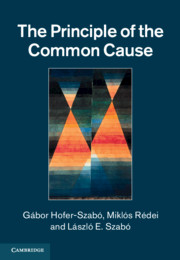Book contents
- Frontmatter
- Contents
- Preface
- 1 Introduction and overview
- 2 The Common Cause Principle
- 3 Common cause extendability of probability spaces
- 4 Causally closed probability theories
- 5 Common common causes
- 6 Common cause extendability of nonclassical probability spaces
- 7 Reichenbachian common cause systems
- 8 Causal closedness of quantum field theory
- 9 Reichenbach's Common Cause Principle and EPR correlations
- 10 Where do we stand?
- Appendix
- References
- Index
1 - Introduction and overview
Published online by Cambridge University Press: 05 June 2013
- Frontmatter
- Contents
- Preface
- 1 Introduction and overview
- 2 The Common Cause Principle
- 3 Common cause extendability of probability spaces
- 4 Causally closed probability theories
- 5 Common common causes
- 6 Common cause extendability of nonclassical probability spaces
- 7 Reichenbachian common cause systems
- 8 Causal closedness of quantum field theory
- 9 Reichenbach's Common Cause Principle and EPR correlations
- 10 Where do we stand?
- Appendix
- References
- Index
Summary
No correlation without causation. This is, in its most compact and general formulation, the essence of what has become Reichenbach's Common Cause Principle.
More explicitly, the Common Cause Principle says that every correlation is either due to a direct causal effect linking the correlated entities, or is brought about by a third factor, a so-called Reichenbachian common cause that stands in a well-defined probabilistic relation to the correlated events, a relation that explains the correlation in the sense of entailing it.
The Common Cause Principle is a nontrivial metaphysical claim about the causal structure of the World and entails that all correlations can (hence, should) be explained causally either by pointing at a causal connection between the correlated entities or by displaying a common cause of the correlation. Thus, the Common Cause Principle licenses one to infer causal connections from probabilistic relations; at the same time the principle does not address whether the causal connection holds between the correlated entities or between the common cause and the elements in the correlation.
While the technically explicit notion of common cause of a probabilistic correlation within the framework of classical Kolmogorovian probability theory is due to Reichenbach (1956), the Common Cause Principle was articulated explicitly only later, especially in the works by W. Salmon (see the “Notes and bibliographic remarks” to Chapter 2). The chief aim of this book is to investigate the Common Cause Principle; in particular, the problem of to what extent the Common Cause Principle can explain probabilistic correlations.
Information
- Type
- Chapter
- Information
- The Principle of the Common Cause , pp. 1 - 10Publisher: Cambridge University PressPrint publication year: 2013
